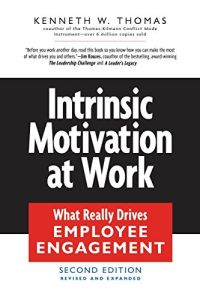Join getAbstract to access the summary!

Join getAbstract to access the summary!
Kenneth W. Thomas
Intrinsic Motivation at Work
Building Energy and Commitment
Berrett-Koehler, 2000
What's inside?
Forget “Show me the money!” These days it’s “Show me the meaning!”
Recommendation
Kenneth W. Thomas presents a model for using intrinsic motivation in the workplace to assure a more committed, self-managed workforce. He advocates leading for meaningfulness, choice, competence, and progress. He emphasizes the need to use this approach to give employees the greater independence and decision-making authority they need as bureaucratic management models break down. While many of these themes are presented in other books on leadership, motivation, training and worker empowerment, Thomas pulls them together in a well-organized, clearly written presentation that gives readers clear directions. The succinct style of writing is easy to understand, even though it is directed toward the serious reader. getAbstract recommends this book to executives, managers, trainers and management consultants, as well as to employees, who will find helpful ideas for exercising greater self-management.
Summary
About the Author
Kenneth W. Thomas, Ph.D., is a professor of management at the Naval Postgraduate School in Monterey, California. He has also served on the management faculties at UCLA, Temple University, and the University of Pittsburgh, where he was director of the doctoral program. He is known for his research and training materials on conflict management. He is the author of Thomas-Kilmann Conflict Mode Instrument, which is widely cited in the literature on conflict resolution, and is featured in the training video Dealing with Conflict.

















Comment on this summary